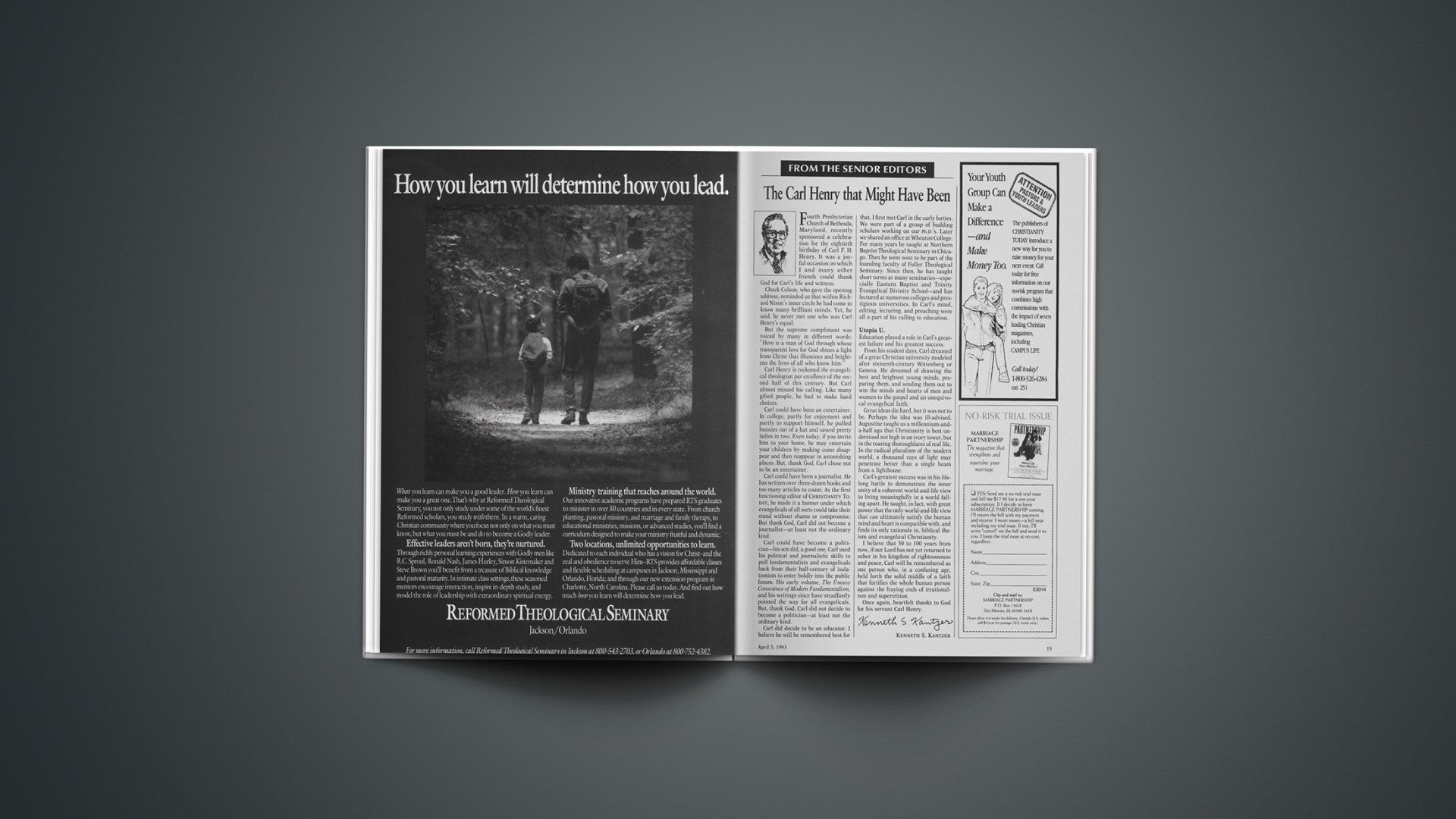Fourth Presbyterian Church of Bethesda, Maryland, recently sponsored a celebration for the eightieth birthday of Carl F. H. Henry. It was a joyful occasion on which I and many other friends could thank God for Carl’s life and witness.
Chuck Colson, who gave the opening address, reminded us that within Richard Nixon’s inner circle he had come to know many brilliant minds. Yet, he said, he never met one who was Carl Henry’s equal.
But the supreme compliment was voiced by many in different words: “Here is a man of God through whose transparent love for God shines a light from Christ that illumines and brightens the lives of all who know him.”
Carl Henry is reckoned the evangelical theologian par excellence of the second half of this century. But Carl almost missed his calling. Like many gifted people, he had to make hard choices.
Carl could have been an entertainer. In college, partly for enjoyment and partly to support himself, he pulled bunnies out of a hat and sawed pretty ladies in two. Even today, if you invite him to your home, he may entertain your children by making coins disappear and then reappear in astonishing places. But, thank God, Carl chose not to be an entertainer.
Carl could have been a journalist. He has written over three-dozen books and too many articles to count. As the first functioning editor of CHRISTIANITY TODAY, he made it a banner under which evangelicals of all sorts could take their stand without shame or compromise. But thank God, Carl did not become a journalist—at least not the ordinary kind.
Carl could have become a politician—his son did, a good one. Carl used his political and journalistic skills to pull fundamentalists and evangelicals back from their half-century of isolationism to enter boldly into the public forum. His early volume, The Uneasy Conscience of Modern Fundamentalism, and his writings since have steadfastly pointed the way for all evangelicals. But, thank God, Carl did not decide to become a politician—at least not the ordinary kind.
Carl did decide to be an educator. I believe he will be remembered best for that. I first met Carl in the early forties. We were part of a group of budding scholars working on our Ph.D.’s. Later we shared an office at Wheaton College. For many years he taught at Northern Baptist Theological Seminary in Chicago. Then he went west to be part of the founding faculty of Fuller Theological Seminary. Since then, he has taught short terms at many seminaries—especially Eastern Baptist and Trinity Evangelical Divinity School—and has lectured at numerous colleges and prestigious universities. In Carl’s mind, editing, lecturing, and preaching were all a part of his calling to education.
Utopia U.
Education played a role in Carl’s greatest failure and his greatest success.
From his student days, Carl dreamed of a great Christian university modeled after sixteenth-century Wittenberg or Geneva. He dreamed of drawing the best and brightest young minds, preparing them, and sending them out to win the minds and hearts of men and women to the gospel and an unequivocal evangelical faith.
Great ideas die hard, but it was not to be. Perhaps the idea was ill-advised. Augustine taught us a millennium-and-a-half ago that Christianity is best understood not high in an ivory tower, but in the roaring thoroughfares of real life. In the radical pluralism of the modern world, a thousand rays of light may penetrate better than a single beam from a lighthouse.
Carl’s greatest success was in his lifelong battle to demonstrate the inner unity of a coherent world-and-life view to living meaningfully in a world falling apart. He taught, in fact, with great power that the only world-and-life view that can ultimately satisfy the human mind and heart is compatible with, and finds its only rationale in, biblical theism and evangelical Christianity.
I believe that 50 to 100 years from now, if our Lord has not yet returned to usher in his kingdom of righteousness and peace, Carl will be remembered as one person who, in a confusing age, held forth the solid middle of a faith that fortifies the whole human person against the fraying ends of irrationalism and superstition.
Once again, heartfelt thanks to God for his servant Carl Henry.
KENNETH S. KANTZER










